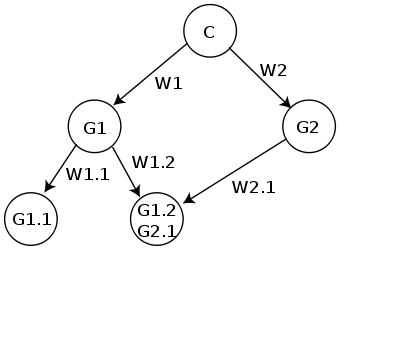
Practical arguments
Encyclopedia
Practical arguments are a logical structure used to determine the validity or dependencies of a claim.
See argument
for uses and general information.
s.
The object of a discussion is often to resolve a difference of opinion.
This requires common grounds from which to logically convince your opponent that your claim is better supported and that their claim is supported by false grounds and or warrants. (see Occam's razor
) If one has no grounds or warrants to support ones claim, then one has no argument just a belief/claim, probably an inaccurate one.
Example 1:
Example 2:
See argument
Argument
In philosophy and logic, an argument is an attempt to persuade someone of something, or give evidence or reasons for accepting a particular conclusion.Argument may also refer to:-Mathematics and computer science:...
for uses and general information.
Overview
An argument can be thought of as two or more contradicting tree structureTree structure
A tree structure is a way of representing the hierarchical nature of a structure in a graphical form. It is named a "tree structure" because the classic representation resembles a tree, even though the chart is generally upside down compared to an actual tree, with the "root" at the top and the...
s.
- The root of each tree is a claimLogical assertionA logical assertion is a statement that asserts that a certain premise is true, and is useful for statements in proof. It is equivalent to a sequent with an empty antecedent....
; A belief supported by information. - The root branches out to nodesNode (computer science)A node is a record consisting of one or more fields that are links to other nodes, and a data field. The link and data fields are often implemented by pointers or references although it is also quite common for the data to be embedded directly in the node. Nodes are used to build linked, often...
that are grounds; supporting information. - The edges connecting them are warrants; rules or principles.
- Claims, grounds and warrants are often not known for certain, so they are presented with a qualifier to indicate their probability.
- When a ground is disputable it is a sub claim, in this way the tree can grow to be quite large.
The object of a discussion is often to resolve a difference of opinion.
This requires common grounds from which to logically convince your opponent that your claim is better supported and that their claim is supported by false grounds and or warrants. (see Occam's razor
Occam's razor
Occam's razor, also known as Ockham's razor, and sometimes expressed in Latin as lex parsimoniae , is a principle that generally recommends from among competing hypotheses selecting the one that makes the fewest new assumptions.-Overview:The principle is often summarized as "simpler explanations...
) If one has no grounds or warrants to support ones claim, then one has no argument just a belief/claim, probably an inaccurate one.
Example 1:
- Claim: Cats are less intelligent than dogs.
- Ground: Cats cannot learn to do tricks as well as dogs do.
- Warrant: The ability to learn tricks is a mark of intelligence.
Example 2:
- Where: C=claim, W=warrant, G=ground, and Q=qualifier
- C: Humans can't fly.
- Q: In a gravity field without assistance or modification
- W1: Because it defies the laws of Newtonian physics it can not be done.
- Q: Fact
- G1: It defies the laws of Newtonian physics.
- Q: Disputable fact
- W1.1: Because Newtonian physics applies it would defy the laws of Newtonian physics.
- Q: Fact
- G1.1: Newtonian physics apply to all super quantum systems including people
- Q: Fact
- W1.2: Because there is no print record it is highly improbable.
- Q: Highly improbable
- G1.2: There is no print record of any reputable person claiming such a thing.
- Q: Fact
- W2: Because no one has ever flown, it is highly improbable.
- Q: Highly improbable
- G2: No one has ever flown.
- Q: Disputable fact
- W2.1: Because there is no print record it is highly improbable.
- Q: Highly improbable
- G2.1: There is no print record of any reputable person claiming such a thing.
- Q: Fact


